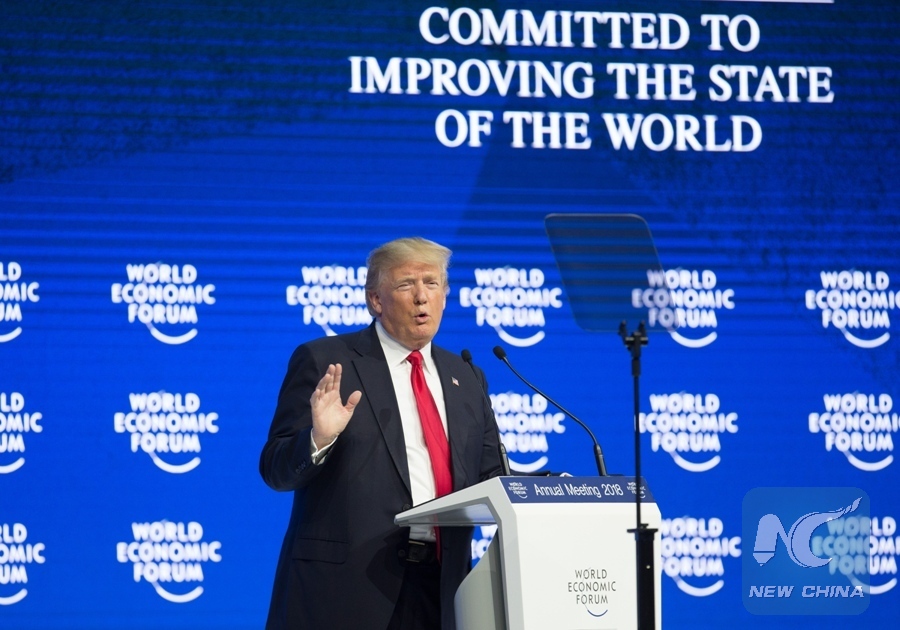
Photo taken on Oct. 31, 2017 shows Angus cows at Bill's farm in Omaha, the United States. Omaha is poised to become a household name in China since its Greater Omaha Packing company sent about 40 boxes of its products to China on June 14, soon days after the United States and China reached a deal to re-open Chinese markets for U.S. beef as part of their 100-day action plan to boost bilateral economic cooperation. (Xinhua/Han Fang)
WASHINGTON, March 27 (Xinhua) -- The U.S. and China are not predestined to clash, a renowned historian at Yale University has said.
As Washington increasingly ramped up rivalry policies against Beijing, Paul Kennedy, the author of the 1987 epic book "The Rise and Fall of the Great Powers," highlighted the value of patience and mutual understanding for more productive bilateral ties.
NO SINGLE MAGIC WAND
"Can we avoid the Thucydides trap?" asked Kennedy, a 72-year-old Yale professor, in a recent interview with Xinhua.
The Thucydides trap, a catchphrase coined by Harvard professor Graham Allison, refers to the notion that when a rising power challenges an established one, conflict may ensue.
As China has become a major player in the world, the assumption of an unavoidable collision between Washington and Beijing has prevailed.
However, for Kennedy, an Oxford-trained Briton, the big clash is not inevitable, and recognizing the trap is the first and a significant step in avoiding conflict.
"If you have leadership on both sides which recognizes that the single most important issue in big world power affairs is to avoid a serious China-America confrontation, then yes, we avoid it," the professor said.
"At least one side has understood the Allison thesis (the Thucydides trap)," Kennedy added, referring to a speech made by Chinese President Xi Jinping about three years ago.
In a 2015 trip to Washington, Xi said that China and the United States should keep their relations from falling into the trap.
Xi also noted that the two sides should expand cooperation and manage and control their differences to benefit more people of the two countries and the world at large.
Meanwhile, the Yale scholar cautioned that it is really difficult, "politically, emotionally, instinctively," to get the relations between the great powers right.
In fact, U.S. President Donald Trump's administration, under the "America First" slogan, has already rolled out adversary plans and laws in the past months against China, ranging from the widely-criticized China tariffs, to the signing of the denounced "Taiwan Travel Act," and the warship provocation in the South China Sea.

U.S. President Donald Trump delivers a speech during the 48th annual meeting of the World Economic Forum (WEF) in Davos, Switzerland, on Jan. 26, 2018. U.S. President Donald Trump said Friday that he would always put America first when it came to trade, but "America First" does not mean America alone. (Xinhua/Xu Jinquan)
The tariffs are counterproductive to the American economy, and the simplistic win-lose view will be derided "by every economist we know," said Kennedy.
"Let's have this policy of patience and mutual understanding," the historian suggested.
Considering how "vast and complicated" the U.S.-China relationship is, Kennedy said there is "no single significant magic wand" that can suddenly transform the bilateral ties.
If the overall world cake is bigger, then "there is less prospect of a structural clash," the professor added.
EXAGGERATED CHINA THREAT
Referring to the latest advocation of China threat in the West, Kennedy said that it could be a "too colorful" portrayal which failed to understand China's worries and weaknesses.
"We can produce all sorts of data which shows that China is 50-foot high and we could produce a lot more data which shows that China is four-foot high," he said. "So be careful which facts are being offered."
"All of the threat from China could be too exaggerated," Kennedy added.

File Photo: A worker counts Chinese currency Renminbi (RMB) at a bank in Linyi, east China's Shandong Province, Aug. 11, 2015. (Xinhua/Zhang Chunlei)
Meanwhile, the professor also pointed out that, as China has been steadily taking a larger share of global production in the past 30 years, it's natural that the Americans would be concerned about China's rise and the United States' relative decline.
The professor noted that a lack of mutual understanding could lead to mistrust.
"If one thing that China has a problem understanding current United States, then I would say in fairness, Americans, including clever Americans, have a problem understanding and trying to really measure the size of the American competitiveness challenge," Kennedy said.
LIVING IN DAMAGING TIMES
In the final chapter of his book in 1987, Kennedy predicted a possible relative shrinking of the United States' power in the world affairs, seeing it as a challenge for the U.S. leadership to manage "cleverly this relative decline."
Commenting on the current "chaotic and turbulent and confusing policies" coming out of the Trump administration, Kennedy said that it is a case of "profound mismanagement and failure to understand the world as it is."
"We live in damaging times," Kennedy said.
Meanwhile, Kennedy noted that so far Trump's presidency with policies out of "instinct" and "emotion" has "probably not yet" permanently damaged the relative U.S. position in the world.
"If there are further rash and counter-productive decisions by the White House, then it could so inflict damage on America's competitiveness, internal social fabric on cohesion, that it would weaken the country's position," said Kennedy.
"It would make it more difficult for Mr Trump's successor, when it comes ... to repair(ing) the damage," the scholar added.
Meanwhile, Kennedy pointed out that in the future, the United States may lose its number one title without losing a great power stage, as "it's too strong and too resilient."
Thirty-one years on, Kennedy said he still believes that the economic foundation of a great power determines and influences its relative position, the key argument in his 1987 book.
"There is nothing in the larger argument, in my humble view, which needs changing," the professor said.

